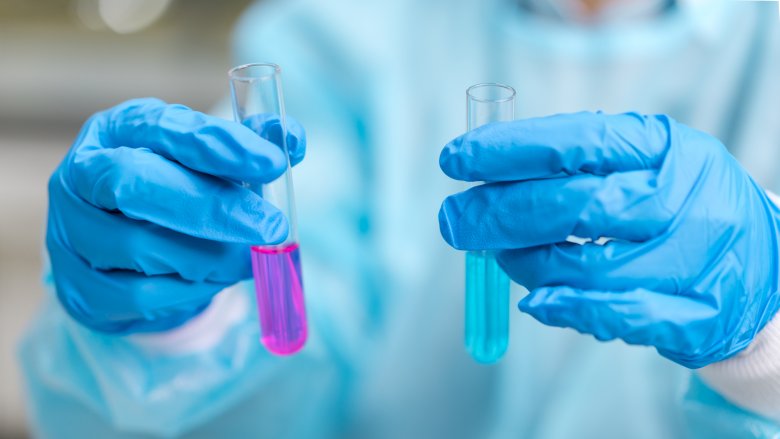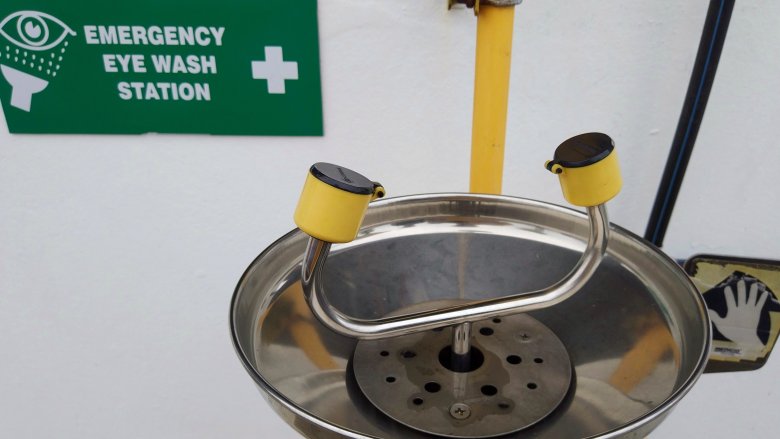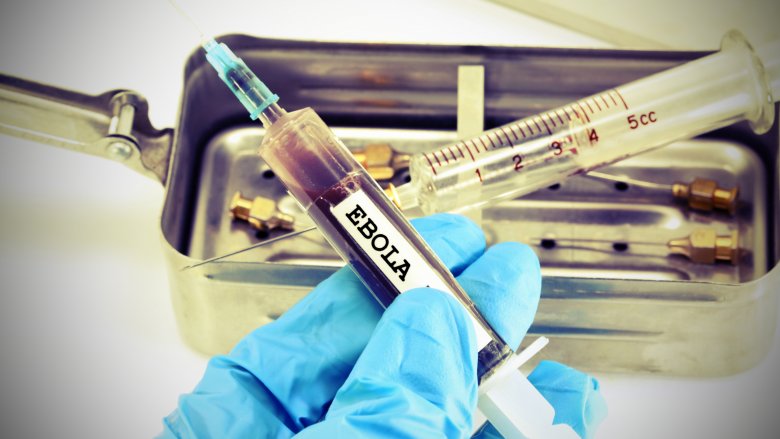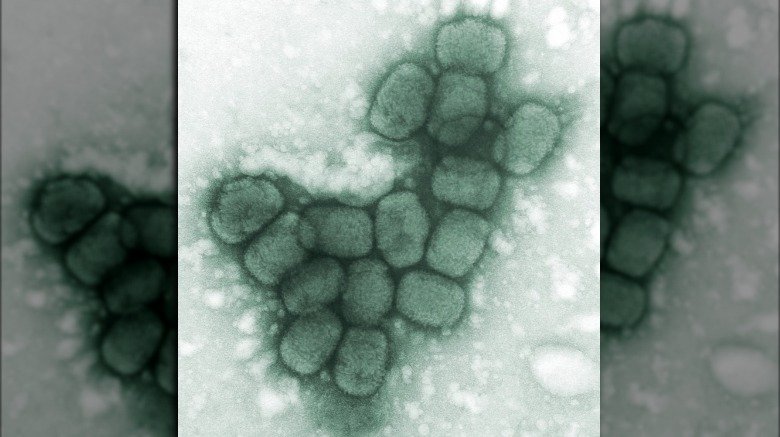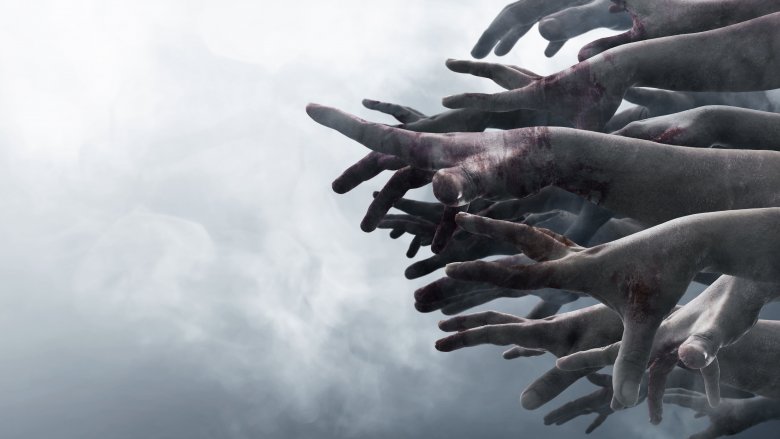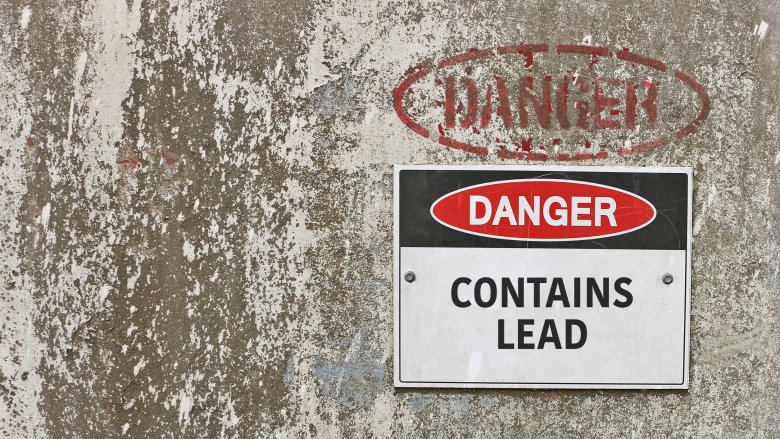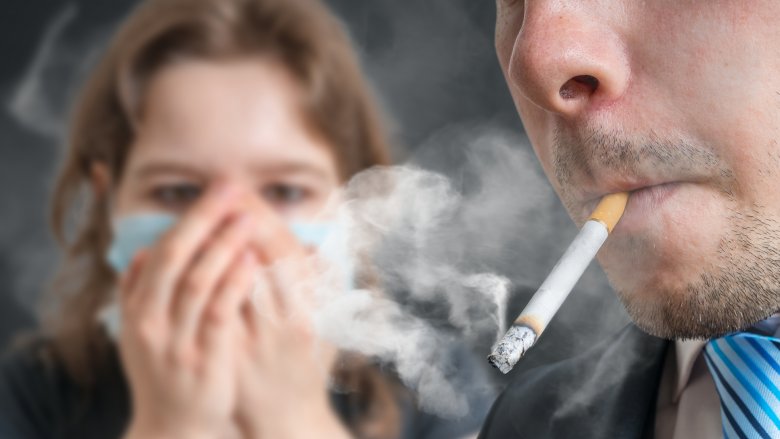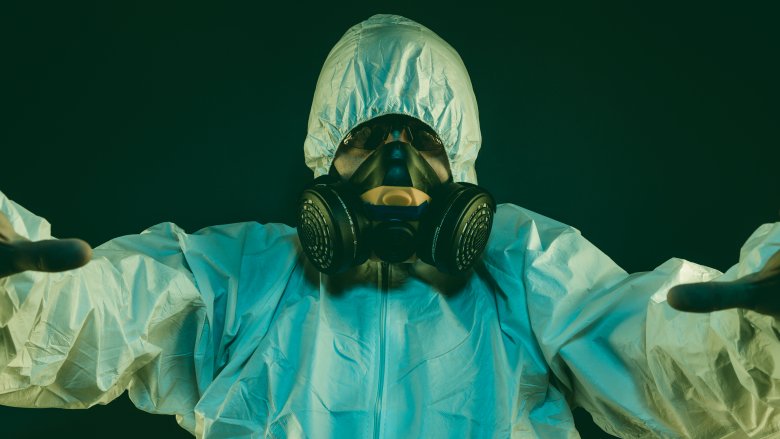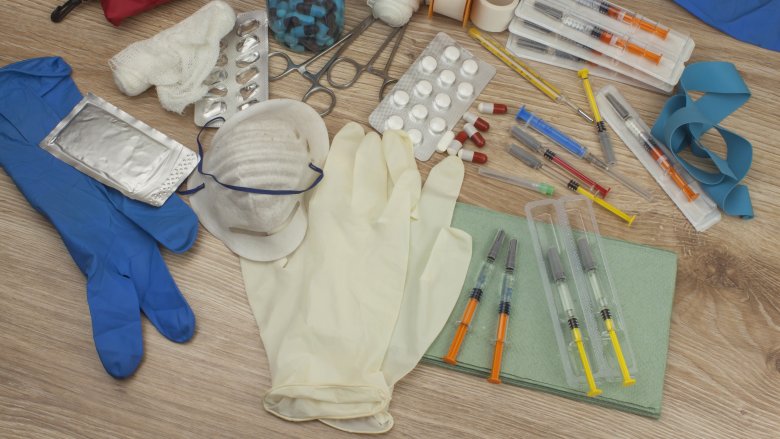What Really Happens At The CDC
In the likely event of a global pandemic or a zombie apocalypse, everyone knows the Centers for Disease Control and Prevention (CDC) is our only hope. That's where scientists are working to find cures to the world's most deadly viruses, and to develop a system for containing the next outbreak before it wipes out half the population and Gwyneth Paltrow. At least, that's what we think they're doing.
The trouble with making assumptions about the CDC is that a lot of what happens there happens behind closed doors, so although we like to imagine that no one goes in or out of those laboratories without taking every possible safety precaution, scientists are only human. So how can we really be sure that some CDC scientist won't show up to work hungover and accidentally walk out of the lab with smallpox on his coffee cup? We can't ever know for certain every single thing that goes on at the CDC, and unfortunately, the things we do know really aren't very comforting.
Safety precautions are for suckers
Every fast food worker knows every burger is a special responsibility. Customers must receive only the finest quality burgers that look exactly like the ones on TV, complete with cheese melted just-so and exactly the right amount of shine without being too greasy. Only not really, because fast food workers get paid like crap and no one ever died from a burger with an off-center piece of cheese.
CDC workers, on the other hand, have real life or death responsibility. Protect that sample of deadly virus or else everyone dies and/or becomes characters in the next Hollywood pandemic film, assuming there are enough humans left in Hollywood after the pandemic has wiped out 80 percent of the population. So we just have to trust that the CDC only hires the most conscientious people. Except there was that one time when CDC workers accidentally got exposed to some deadly infectious diseases and oh crap, it wasn't just that one time.
According to USA Today, the CDC has been accused of all sorts of safety blunders, from losing an entire box full of deadly flu virus to incidents involving the failure of safety equipment. But don't worry, the CDC said in a statement, "None of the incidents described in these documents resulting in reported illness among CDC staff or public." So it must be okay then. Right?
Here, have some of this Ebola
It takes global effort to conquer deadly diseases, so it does kind of make sense that labs with samples of disease agents might want to share with labs elsewhere, so everyone gets to have a firsthand look at the enemy. "We ship over 300 agents to several dozen countries every year," a CDC spokesman said in 2002. So that's comforting and shouldn't at all remind you of anything that happened in 12 Monkeys.
The real problem with generously sharing viral agents that could destroy the entire world and send Bruce Willis back through time is you can never unequivocally say the country you just sent those 300 viral agents to isn't one day going to be controlled by a crazy dictator who will go, "Cool, viral agents" and then use them to build biological weapons, thus beginning the cycle of Bruce Willis all over again. According to UCLA, back in the 1980s the CDC sent a bunch of diseases to Iraq long before Iraq was on the "don't send diseases" list. It looks like they never actually did anything insidious with those samples, but still, you never know when a rogue king is going to conquer the U.K. or something, so it seems like we need to hold off on the germy gift boxes until we figure out how to see into the future.
But what if we need all that smallpox?
So what happens when science achieves that ultimate success — total eradication of a deadly disease? Shouldn't it celebrate by, you know, having a glass of champagne and putting the rest of those virus samples into an incinerator?
No, because what if you need them again? Yes, the CDC is like your weird aunt who still has every coat hanger she ever got from the dry cleaner because it might be useful some day. According to NPR, the CDC is one of only two places in the world that still have a sample of the smallpox virus. The other one, just in case you were worried, is Russia, because of their stellar track record of taking care with dangerous technology and making rational decisions in general.
So why does the CDC need these samples? Because some rogue state might have a secret smallpox stash of their own or could possibly recreate the virus genetically. So that sample could one day help scientists develop new treatments for an old disease. Because in this era of globalization, it would be next to impossible for the CDC to just fly out to ground zero of the next outbreak and take some samples from patients ... oh, wait.
Just in case you thought zombies were fiction
The downfall of the human race won't be smallpox or anthrax or whatever it was that killed Gwyneth Paltrow in that one movie. It will be zombies. And it's not just the creators and fans of The Walking Dead who think that a zombie apocalypse might actually happen, it's also sort of the CDC. Yes, the CDC not only has a zombie preparedness blog but also a zombie preparedness poster, a brochure to help educators prepare for the zombie apocalypse, and a zombie preparedness graphic novel.
So what's the deal, does the CDC really think a zombie apocalypse is coming? Probably not. On their website they call the effort "a tongue-in-cheek campaign to engage new audiences with preparedness messages," so basically it's just a way to get Walking Dead fans to read educational materials. But hey, as it turns out, preparing for any kind of pandemic is pretty similar to preparing for a zombie pandemic, so maybe they're onto something. And the tactic seemed to work, too — the first time the CDC tried to spread the message of zombie preparedness, they got so much traffic that their server crashed. And crashing web servers, as you know, is one of the first things that will happen in a real zombie apocalypse. Hmm, better make sure you've got plenty of water and bleach stashed away in your garage, just in case.
Research all you want but don't let anyone see your conclusions
Gun violence is a public health issue, just like Ebola, avian flu, and Fortnite. So the CDC keeps data on gun deaths in America, because it's kind of their job to keep data on everything that kills people in America, but until recently they haven't actually been allowed to use that data to suggest policy. So that's kind of like if you had statistical evidence that seatbelts save lives but you weren't actually allowed to share that information with car makers, so car makers would never bother to put seatbelts in any of their vehicles. And what's more, you probably wouldn't be encouraged to do any further research on ways you could make seatbelts even better and even safer, because what would be the point?
That's pretty much exactly what happened when the Dickey Amendment was signed into law a couple decades ago. According to NPR, the Dickey Amendment was basically a compromise between pro- and anti-gun rights groups which said the CDC could do research on gun deaths but it wasn't allowed to use any of that research to suggest policy. That was sort of the status quo until a line in the 2018 spending bill basically reversed that philosophy, granting the CDC the right to share the results of gun violence research. Hopefully, they'll also include some research about what happens to a walking corpse when it's hit with a bullet. Zombie preparedness, man.
The CDC doesn't like snitches
No one likes to look bad in front of people, and because the CDC is the organization we all look to in the event that something really, really terrifying happens (hopefully zombies), they especially don't want to look bad in front of people.
According to the U.S. Office of Special Counsel, in July 2016, a CDC microbiologist and lab chief named Dr. Robert Lanciotti asked the Department of Health and Human Services to investigate a CDC decision to recommend a Zika test that he alleged was about 40 percent less accurate than another readily available test. The CDC countered that there was no evidence to support Lanciotti's claims about the relative accuracy of the two tests.
The issue was not just that they seemed to not be at all concerned that they might be recommending an inferior test, but that they were also super-annoyed at Lanciotti for bringing the issue up. So they ended up demoting him to a "non-supervisory position," because of reasons. Lanciotti filed a whistleblower retaliation claim and was eventually reinstated as lab chief, but it's probably safe to say there is still some tension at the office holiday party.
Lead? What lead?
More than a decade before the Flint, Michigan, water crisis, kids in Washington D.C. were drinking lead-contaminated water and no one bothered to tell the public.
According to the Legal Examiner, there is evidence that officials knew something was amiss by 2003 because they called meetings to "discuss and solicit public comments" about the city's drinking water, but they never went so far as to say, "Hey, there might be lead in the water." It wasn't until 2004 that D.C. residents learned they were drinking, cooking with, and making baby formula out of water that had lead levels above the federal limits.
So what does the CDC have to do with all this? In 2004 they basically poo-pooed the public's concerns — residents didn't have increased blood-lead levels, so that must mean that since the problem wasn't hurting anyone (yet), it must not be an actual problem. Solid logic. The U.S. House of Representatives Committee on Science and Technology wasn't buying it, though, so they launched their own investigation and found the CDC had basically just thrown together a report designed to make people feel safe without actually addressing the problem. It's not really clear if it was sloppiness or insidiousness, but does it really matter?
Don't smoke! Unless it's Marlboros because I'm a stockholder.
There are just two qualities we want in a CDC director: understanding of human health and being mostly free from corruption. Evidently, those qualities are pretty hard to find in one person.
In 2018, CDC Director Brenda Fitzgerald resigned after Politico revealed she bought shares in tobacco stock roughly one month after she took the job. There doesn't seem to be any evidence that she tried to influence public policy in favor of big tobacco, but it was still a really stupid move. "You don't buy tobacco stocks when you are the head of the CDC," ethics lawyer Richard Painter said when the story broke. "It's ridiculous; it gives a terrible appearance."
But it wasn't the first time such a thing happened at the CDC. In 2016 a CDC higher-up had to resign after the media found out she'd been talking to a Coca-Cola advocate about health policy. And Robert Redfield, who runs the CDC as of March 2018, appears to not be corrupt, necessarily, but merely a "homophobic public health quack" who during the late 1980s and early 1990s mandated HIV testing for military service people and then advocated forced isolation for those who tested positive. People confined to "HIV hotels" were allegedly "treated like prisoners" until they either became sick with AIDS or received a dishonorable discharge. If that's the sort of thing we can expect during a global pandemic, we all have reason to be afraid.
The FBI of disease
Today, we live in a world where disease isn't just something that happens accidentally — it gets put in bombs, sent through the mail, and rubbed all over the blankets of our enemies. (Actually that last bit was something colonists — probably — did a couple hundred years ago, so maybe the world hasn't actually changed that much.) At any rate, the CDC is no longer just a public health agency. Today they're more like the FBI of diseases.
The CDC was once solely a public health organization, but their mission has expanded to include homeland security, so they're focused as much on terrorism as they are on seasonal flu and outbreaks of vaccine preventable diseases, which by the way are only a problem because people will believe anything they read on the internet.
Part of the CDC's mission includes preparing for "biological, chemical, radiological, nuclear, and explosive emergencies." So we should all take comfort in knowing that in the event of any sort of disease outbreak or terrorist attack, the CDC has our backs, and totally intends to inform us of just how bad the problem is, just like they always have. At least we think so. But maybe just buy a couple of respirators and several tons of dried beans, just in case.
At least no one will ever steal a deadly pathogen ... hopefully
The good news is the CDC does have some pretty serious security protocols in place to prevent the theft of all those dangerous pathogens, so there's not much chance enemy agents will break in and steal the raw materials for a biological weapon.
According to the Center for Infectious Disease Research and Policy, the CDC expanded its security protocols in 2002 in response to the Public Health Security Bioterrorism Preparedness and Response Act, which outlined the way deadly disease agents should be handled and also required that labs register with the Department of Health and Human Services if they're in possession of potentially world-ending disease agents. The CDC also has pretty strict security protocols in their facilities — employees need badges to move around CDC buildings, no one is allowed to wander, and pretty much every room and hallway is under 24-hour video surveillance. There are no maps of the campus, so the location of individual labs and offices is basically on a need-to-know basis.
So those deadly pathogens aren't likely to end up in enemy hands, unless of course the CDC gave the enemy the raw materials back in the '80s, or lost them or, you know, the enemy found someone with Ebola or anthrax or something and just took their own samples. Anyway. As far as breaking into the CDC to steal deadly diseases, it's next to impossible.
We can't afford this global pandemic
So let's say a strange disease shows up somewhere in Australia. Local emergency workers, well trained in epidemic response, spring into action and within hours have contained the disease, preventing it from spreading to nearby New Zealand or making the jump to Europe or America. Crisis averted.
And that's exactly how it would work except for the small problem of the CDC not really having any money to deal with the whole global pandemic thing. According to the Washington Post, as of February 2018, the CDC announced it's cutting back on epidemic preparedness in 39 out of 49 countries because the $600 million it got as a part of a 2014 effort to contain the Ebola outbreak is almost gone. The money was used to train disease detectives and rapid responders on how to detect and contain an outbreak in their own countries, and without it the CDC will have to scale back on some of those educational programs.
Hopefully, there are now people on the ground who are qualified to stop a deadly outbreak, which is what happened in the Congo in 2017, when an Ebola outbreak was contained by locals who had been specially trained by the CDC. But still, ongoing training is probably a good idea when the only thing standing between the world and a pandemic is a guy who learned virology 15 years ago and never got a refresher course. Don't you think?
Atlanta CDC
In the first season of The Walking Dead, the CDC headquarters in Atlanta explodes. It's not just any explosion, though; it's a technology that "sets the air on fire," thus guaranteeing the complete destruction of the CDC's entire body of research. Why? Because the generators ran out of gas.
Now, that does seem a little short-sighted because there are probably survivors who could maybe use some of that information, and it seems kind of petty to just blow it all up because it's not so easy to obtain gasoline in the apocalypse. Politifact seemed kind of worried about the whole exploding CDC thing, too, because after the episode aired they went out of their way to let everyone know there was no need for concern.
The CDC is, in fact, headquartered in Atlanta, but CDC officials told Politifact that The Walking Dead didn't actually consult them before writing and filming that particular episode. (Gasp!) And evidently they got a few things wrong — in the case of a global pandemic, the CDC "does have systems in place, but none of them involve explosives." And despite all that zombie preparedness stuff on their website, they evidently don't have a doomsday plan, either. Well, okay, we can probably live with that. In the event of a zombie apocalypse, we wouldn't want the CDC spoiling all our fun, anyway.
